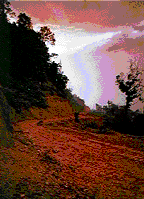

Today the forests of the Penan are a place of promise and tragedy. As the roads pierce the wild heart of the interior, the Penan find themselves overwhelmed by the frenzy of logging that has gripped Malaysia over the last three decades. It is a rate of forest destruction twice that of the Amazon and by far the highest in the world. In 1983 Malaysia accounted for almost 60% of the total global export of tropical logs. By 1985, three acres of forest were being cut every minute of every day. With the primary forests of peninsular Malaysia becoming rapidly depleted, the industry turned to Sarawak.
Logging practices in Borneo in the last decade have plundered an extraordinary natural resource. Waste in the industry has been estimated as high as 50%... for every cubic meter of wood sold, another cubic meter is cut but discarded.

"There are none of the sounds that we long for, no sound of birds, nor of deer and other animals. The only sound is that of bulldozers, the sound of trucks, and these sounds make us so sorrowful...
" During the lifetime of our parents we never had to look at red land, we never had to endure the kind of problems we are enduring today. And that is what we always talk about, when we gather together. In the time of our parents we never had these difficulties. That is what we always talk about. When we think of the problems we have today, we feel sad and we cry. If we think of these problems at mealtime, our food loses its taste. And we wonder if there is anyone who can give us comfort, is there anyone who is willing to help us with our problems. "
Lejeng Kusin

"I will not bow to experts. I am the expert. I was here before the experts were born."
James Wong, State Minister of the Environment and one of Sarawaks' major logging concession holders
The politics of timber in Sarawak begin and end in money. Between 1976 and 1982 the value of timber exported from Sarawak increased from US$138 million to US$525 million. By 1991 the figure was US$1,292 million. In an economy based almost exclusively on the exploitation of natural resources, and in a region where most of the population remain subsistence farmers, this income represents a staggering concentration of wealth. Far from benefiting the rural poor, forest management in Sarawak has been subverted to serve the interests of the ruling elite, who have used their control of the licensing of logging concessions as a political tool, a source of personal wealth, and a means of retaining economic and political power. The authority to grant or deny logging concessions lies strictly with the Minister of Resource Planning. There is no competitive bidding, nor any legal or technical restrictions on who may be awarded a concession. Recipients have included relatives, friends, political associates, and even the Sarawak Football Association.